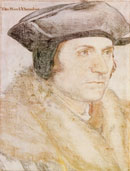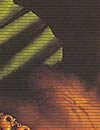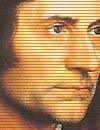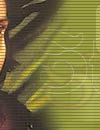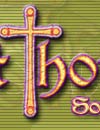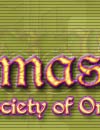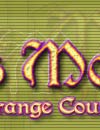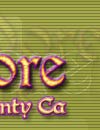St. Thomas More on Eternity
Throughout the time of his imprisonment, More's greatest sufferings did not come from his poverty or his poor health or his weak-willed friends. They came from his own family. Having taken such great care to educate his children, More now found that none of them supported him in his decision of conscience. Nor did his wife!
Lady Alice was especially opposed. Son-in-law Roper tells us that when she was finally able to see her husband for the first time, she "bluntly" greeted him thus: "Master More, I marvel that you, who have always been taken for such a wise man, should now play such a fool as to lie here in this tiny, filthy prison and be content to be shut up with rats and mice when you could be about and at your liberty." After quietly listening to her long reproof, More - with a cheerful expression said to her, "I pray you, good Mistress Alice, tell me one thing." Roper continues:
"What is that?" She said.
"Is not this house as close to heaven as my own?"
To which she, after her accustomed fashion, not liking such talk, answered, "Tilly-vally, tilly-vally!"
"But what do you say, Mistress Alice" he asked. "Is it not so?"
"Good God, good God, man, will you never stop repeating the same things?" she said.
"But, Mistress Alice, if they are true, it is very well [that I say them].
At this point Lady Alice "kept on pleading and harping on a long life," so Thomas finally interrupted her.
"How long, my Alice, shall I be able to enjoy this life?"
"A full twenty years, if God so wills."
"Do you wish me, then, to exchange eternity for twenty years? Here, good wife, you do not bargain very skillfully."
Thomas More: Portrait of Courage By: Gerald B. Wegemer (Pg. 171-2)
Back to Quote Index
St. Thomas More on Money
For avarice is not a fault inherent in gold, but in the man who inordinately loves gold... Therefore, it is not an inferior thing which has made the will evil, but it is [the will] itself which has become so by wickedly and inordinately desiring an inferior thing .... Evil is removed, not by removing any nature, or part of a nature . . but by healing and correcting that which had been vitiated and depraved. (City of God p 2.8,6; 14-.II)
In Utopia all greed for money was entirely removed with the use of money .... Who does not know that fraud, theft, rapine, quarrels, disorders, brawls, seditions, murders, reasons, poisonings . . . die out with the destruction of money?... So easily might men get the necessities of life if that blessed money... was not in fact the only barrier to our getting what we need. (Utopia CW4 241-43) (emphasis added)
Thomas More On Statesmanship By: Gerald B. Wegemer (Pg. 128 )
Back to Quote Index
St. Thomas More on Pride
Another point of similarity with the earlier spiritual handbook is the care taken to point out the centrality of pride, "the mischievous mother of all manner of vice." Pride that has been allowed to develop "carries with it a blindness almost incurable." The eyes of the conscience will be dulled unless the "right ointment" has been applied long before such blindness can set in. One powerful ointment More suggests here is the "remembrance and consideration" of death and the peril of hell.
To help in this fight against blinding pride, More offers images of the human condition. ....[...]
This image, however, More considers "too merry for this matter." A more earnest image of our condition, one that he deems "a very true figure" of our state, compares life to a prison. (More favored this image throughout his life; it appears in both his earlier and his later works.)
As for escaping, no man can look for [any hope of that]. The prison is large and has many prisoners in it, but the jailor can lose none. He is present in every place that we can creep into. There is no remedy, therefore, but as condemned folk and remediless in this prison of the earth we drag on for a time, with some bound to a post, some wandering abroad, some in the dungeon, some in the upper ward, some building themselves bowers and making palaces in the prison, some weeping, some laughing, some laboring, some playing, some singing, some chiding, some fighting. No man, almost, remembers in what case he stands until, suddenly, with nothing much looked for, young, old, poor and rich, merry and sad, prince, page, pope, and poor-soul priest --- now one, now another, sometimes a great rabble at once, without order, without respect of age or of estate --- all, stripped naked and shifted out in a sheet, are put to death in different ways in some corner of the same prison, are thrown there in a hole, and are eaten either by worms under the ground or by crows above. Now come forth, you proud prisoner, for I know ... all your pride is because you forget that [this world] is a prison.
Besides these, More uses many other vivid images to reveal what cannot easily be seen and to dissuade his readers from giving in to the various deceptions spawned from the "cankered root of pride."
Thomas More: A Portrait of CourageBy: Gerard B. Wegemer(Pg. 95)
Pride is the great perversion because rational beings were created as "partners of the creator's goodness" not gods in the idolatrous fantasies of their own minds. In every case, the proud person "boldly frame[s] himself a conscience, with a gloss of his own making after his own fantasy". Just as Lucifer and Adam and Eve willfully interpreted God's commands according to their own desires rather than diligently attending to their reason, so every person has the freedom of will to do the same.
Pride, therefore, arises from the soul's intrinsic power to imagine what it wants and then to will freely to delight in that image regardless of its truth or goodness. With this spiritual freedom, rational creatures can will to devise "worldly fantasies" of their own creation that are actually opposed to what, thus leading them to neglect the good and true in order to attend to their own passion or pleasure. Hence, the power of free will is such that what one perceives can be willfully distorted according to one's Own wishes, desires, and expectations. Given this fundamental freedom, all people are capable of rebelling against the indications of the intellect.
Augustine explains this same phenomenon at some length in The City of God. The proud person chooses "to live according to himself," rather than "abide in the truth" (14.3). By "falling away from the work of God to [his] own works," such a person comes to prefer "to rule with a kind of pomp of empire rather than to be another's subject" (14.11). This "self-pleaser" therefore "abandons Him to whom [he] ought to cleave as [his] end, and becomes a kind of end to [him]self" (14.13); he thus chooses "not to live as he was made to live," but "according to a lie" of his own making (14.4). By so "refusing subjection and revolting from Him who is supreme," the proud person actually "falls to a low condition'' by debasing his true nature (14.13). It is the humble person who fulfills and actually exalts his nature by recognizing and accepting his status as a creature. As Augustine puts it, "humility enables us to submit to what is above us; and nothing is more exalted above us than God; and therefore humility, by making us subject to God; and therefore humility, by making us subject to God, exalts us" (14.13).
Thomas More On Statesmanship By: Gerald B. Wegemer (Pg. 31)
Back to Quote Index
